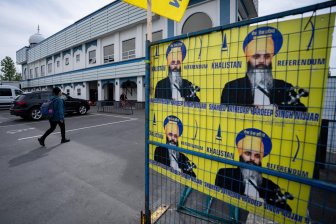TORONTO – Venezuelan President Hugo Chavez died Tuesday at age 58 after a nearly two-year battle with cancer.

So what does this mean for the future of Venezuela?
Director of the Centre for the Study of Democratic Institutions and UBC political science professor Maxwell Cameron says the president of the National Assembly (Diosdado Cabello) should temporarily assume the presidency, and elections will be convened likely within the next 30 days.
Cameron says Chavez’ vice president, Nicolas Maduro, will be a contender, and adds there’s a good chance that past opposition candidate Henrique Capriles will run as well.
“But I wouldn’t discount the Chavista forces, the Venezuelan socialist party,” said Cameron, as he believes they have a good chance of winning.
In terms of an impact on relations with Canada, Cameron says the Harper government’s dissatisfaction with Chavez’s government is no secret (just as there was no “love lost” between the Obama administration and Venezuela).
“I suspect the people who want to see change in Venezuela will see this as opportunity and will hope to see some shift,” said Cameron, but warned that both Canada and the U.S. would be “unwise to appear to be too meddlesome.”
“Probably in the short run, Canada will say, ‘let’s wait and see what happens with the elections,’ and obviously support a fair, clean and transparent election,” suggested Cameron. “But it’s really going to be anyone’s guess what the outcome of that will be.”
- Toronto Pearson gold heist: Ontario man arrested at airport after arriving from India
- Capital gains changes could have ‘irreversible’ effects, business groups warn
- A ‘zombie’ virus is raging among raccoons. What to know
- Could notwithstanding clause be used on abortion? Poilievre’s office says ‘never’
What Cameron finds most interesting is that Chavez’s death will expose the degree to which Venezuelans can have a genuinely competitive election “in an environment in which you no longer have the incredibly commanding presence of Hugo Chavez.”
Cameron says there’s a debate in the political realm over how open, democratic and well-institutionalized Venezuela is, and notes Chavez has “held things together in part by the force of his personality.”
He says the real question will be whether the Venezuelan system has the resilience to democratically survive this transition.
“Can this be an opportunity for bringing the Venezuelan political system back into more of a balance with a greater role for the opposition, and less hostility from the government toward media and opponents and so forth?” he asks.
“Or will we see a further entrenchment and deepening of an increasingly-I wouldn’t’ say authoritarian government-but certainly it’s a hybrid, it’s sort of a mix of democratic and authoritarian features that kind of characterizes the Venezuelan system.”


Comments